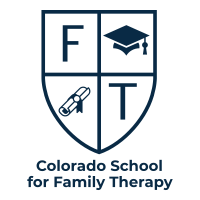The Colorado School for Family Therapy, founded in 1995, is approved and regulated by the Colorado Department of Higher Education, Private Occupation School Board. The School provides an advanced learning
experience and direct clinical practice with families, couples, and individuals. It provides clinicians with the necessary education to become skilled system/relational therapists and leaders in the MFT discipline. The
Commission on Accreditation accredited the Colorado School for Family Therapy for Marriage and Family Therapy Education from July 1, 2001, to November 1, 2012.
A certificate in Marriage and Family Therapy is awarded upon successful completion of the course and supervision requirements in the Marriage and Family Therapy Training Program. The program emphasis is placed on the clinical practice of marriage and family therapy and the leadership, business, and career development of the student. All MFT courses are taught from a systemic/relational perspective.
Academic Courses
Students must complete a total of eleven graduate or postgraduate level courses to gain a Certificate in Marriage and Family Therapy. Prior to graduation, students must have completed these classes between their Master's program and the School's Marriage and Family Therapy Training Program. A minimum of 10 courses and the practicums must be taken at the School.
Available Courses May Include:
- Family Studies: Divorce and Remarriage I: Child and Family Investigations
- Family Studies: Divorce and Remarriage II: Family Mediation
- Family Studies: Divorce and Remarriage III: Parenting Coordination
- Family Therapy: Professional, Ethical, Legal, and Business Issues
- Family Studies Systems Theory
- Family Therapy: Systemic Clinical Supervision
- Family Studies: Theories of Family Development
- Family Studies: Human Sexuality and Couples
- Family Studies: Family Psychopathology
- Family Studies: Ethnicity, Culture, and Gender
- Family Therapy: Family Art Therapy
- Family Studies Theoretical Foundations I
- Family Studies Theoretical Foundations II
- Theories of Personality
- Family Therapy: Initial Session to Termination
- Family Therapy: Family Sandplay Therapy
- Systemic Theory and Research Methods
- Family Therapy: Supervised Clinical Practicum
- Family Therapy: Family Play Therapy
- Family Therapy: Psychopharmacology
Certification and Licensure

Students preparing for LMFT, LPC, LCSW, and LAC licensure and CAC or other professional certifications may receive post-Masters supervision for these disciplines through the program. The post-Masters supervision and client contact hours can be applied to the requirements for Colorado licensure. Each board and certifying group makes its own policies, therefore, it is important that students contact the group of their choice or their licensure board for the appropriate information. Colorado residents may call the Department of Regulatory Agencies (DORA) for database registration, LPC, LMFT, LAC, CAC, and LCSW application. Group supervision is provided in the practicums/case conferences.
Clinical Supervision
All students participate in supervision by licensed or AAMFT Approved Supervisors. "Live" supervision and videotape review are the primary methods of clinical supervision. Fifty hours of all clinical supervision is required to be "live", direct observation, videotape, or audiotape. Families or couples are provided by the school clinics. Supervision includes a meeting to discuss case planning, therapist style, theoretical orientation, and directly observe clinical work.

Clinical Praticum
Students need 2,000 documented systemic client contact hours, 1,000 of which must be with couples or families. All clinical practice must utilize a systemic/relational perspective. Students must complete group supervision in practicums/case conferences.
Tuition
Tuition is payable at the beginning of each course. The entire program cost is $7,000.
Virtual Weekend Classes
Academic classes are scheduled over alternating weekends and Saturdays, 9:00 a.m. - 5:00 p.m. (with a lunch break). Classes are $700.00 each.
Distance Learning Opportunity

How do the distance learning classes in Marriage and Family Therapy (MFT) or Marriage and Family Studies (MFS) work?
After paying for course registration, a student receives a syllabus. Students are assigned an instructor that assignments are mailed or e-mailed to. Telephone or e-mail contact between students and instructors is also maintained. Students keep track of their reading, videotape viewing, and telephone/e-mail conference time.
What distance learning classes in MFT and MFS are available?
The School offers twelve distance learning/independent classes. There are classes in marriage and family studies, human development, professional and ethical issues, research methods, and marriage and family therapy.
How many training hours are available?
Courses are offered in 4-quarter hours/ 1 standard didactic unit (SDU). The student chooses which type of class they want based on the continuing education or licensure classes needed.
How much do the classes cost?
Courses cost $600.00 each. Textbooks and videotapes are purchased separately.
Are other types of distance learning classes available?
Yes – contact the School for inquiries. For example, classes in play therapy are available for RPT registration with the Association for Play Therapy (APT).
How do I register for a distance learning MFT or MFS course?
Students can use the registration form in this brochure. The form can be faxed or mailed to the School with the choice of class and payment (check, money order, VISA, or MasterCard).
Distance Learning MFT/MFS Education Classes
I. Marriage and Family Studies
a. MFS: Ethnicity, Gender, and Culture
b. MFS: Religion and Spirituality
c. MFS: Systems and Leadership Issues
II. Marriage and Family Therapy
a. MFT: Theoretical Foundations
b. MFT: Systemic Clinical Supervision
c. MFT: Family Play Therapy
d. MFT: Initial Session to Termination
III. Human Development
a. MFS: Theories of Family Development
b. MFS: Family Psychopathology
c. MFT: Human Sexuality, Couples, and Sex Therapy
IV. Professional and Ethical Issues
a. MFS: Professional, Legal, and Ethical Issues
